Posted February 19, 2023 by Nicky in Reviews / 0 Comments
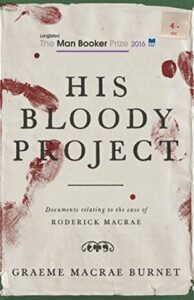 His Bloody Project, Graeme Macrae Burnet
His Bloody Project, Graeme Macrae Burnet
His Bloody Project was an interesting read right after Murder: The Biography, since it touches on the same themes of what is right and just when someone might not be in their right mind — and how you would tell. I could easily imagine this fictional case of Roddy Mcrae being one of the cases discussed in Murder: A Biography, in how Roddy is treated by the law and whether that’s just. (On the other hand, His Bloody Project leaves open the possibility that Roddy knew full well what he was doing, and that he murdered Flora and covered it up via his murder of Lachlan, hoping for more mercy for a “justified” killing.)
The format gets a little repetitive, since things are repeated between the various witness statements, Roddy’s own writing, and the court case itself. Each has subtle variations that cast light on Roddy’s character from different points of view, of course, but even with that cleverness, it’s still repetitive.
After reading it all, I’m still left that little bit uncertain about what to conclude. Was Roddy sane, did he plan this out? Was his written confession an elaborate lie? Does he remember exactly what he did to his victims? I think the hints are telling us that he committed the murder in a very planned way, and then wrote his narrative to cover it up — but there are spaces in between and subtleties that make it hard to be very sure. It’s very cleverly done, even though it isn’t comfortable reading.
Rating: 3/5
Tags: book reviews, books, crime, Graeme Macrae Burnet
Posted February 16, 2023 by Nicky in Reviews / 0 Comments
 The Mysterious Mr. Badman, W.F. Harvey
The Mysterious Mr. Badman, W.F. Harvey
The Mysterious Mr. Badman is a bit unusual, featuring an amateur detective who is usually a carpet manufacturer (as the introduction from the series’ editor says, surely the only amateur detective to have that profession), and who is a kind older man, though backed up by a young nephew and a young woman who is involved in the case. Though it’s billed as a “bibliomystery”, honestly the book doesn’t play a huge part. It might as well be a second-hand suitcase or jacket, for all the book itself matters.
All the same, I found it fun: it was a quick read, and Athelstan Digby and Jim are rather sweet and careful in trying to sort things out and avoid scandal. Private justice, of course, but Digby in particular does his best not to cause lasting harm (padding a poker, for example, so as to knock someone out rather than crack their head open, even when he’s being imprisoned).
I wouldn’t say it particularly stands out among all the British Library Crime Classics, but it was exactly what I want from this series: a classic mystery, where all is resolved at the end, and the world goes back to normal.
Rating: 4/5
Tags: book reviews, books, British Library Crime Classics, crime, mystery, W.F. Harvey
Posted February 14, 2023 by Nicky in Reviews / 0 Comments
 Hexmaker, Jordan L. Hawk
Hexmaker, Jordan L. Hawk
Back to Hexworld, and this second book is as fun as the first. I think I liked them a tiny bit less than Cicero and Tom from the first book, and I thought they needed to do a heck of a lot more communicating (including about their boundaries during sex, which they just kind of plunge into), but Malachi and Owen have a totally different and interesting dynamic, and it worked out well. The power differential between witches and familiars is present in all of these stories, but most of all here, where the personal relationship balances it.
I think overall I’d have liked a bit longer for Owen and Malachi’s relationship to develop; the compressed timescale didn’t quite work for me here, and I could’ve used seeing a little more trust starting to develop between them. The relationship crisis definitely echoed the one in the first book, but I’d felt more closely connected to the relationship in the first book.
I’m curious to see where the overarching plot is going, and I love the background of the world — Owen’s trans brother, because of course hexes can help with that; Egyptian archaeology being relevant for the history of hexes… It’s all pretty fascinating, and as always the book is pacy and fun.
Rating: 4/5
Tags: alternate history, book reviews, books, Jordan L. Hawk, queer fiction, romance, SF/F
Posted February 12, 2023 by Nicky in Reviews / 0 Comments
 Death of an Author, E.C.R. Lorac
Death of an Author, E.C.R. Lorac
Death of an Author is another really enjoyable mystery from E.C.R. Lorac — one slyly self-referential, given the stuff about it being impossible for a female author to write such a mystery, and an outlier as well, because it doesn’t feature her usual series detective. There’s also rather less of an “atmosphere”, though she does describe a couple of the locations very vividly.
The reason I’m losing my head and giving it five stars is that I found the mystery so genuinely intriguing to turn over in my mind. Often when I read mystery novels, I just wait for the author to lead me to the clues, pretty much ever since Sayers and that cheat of withholding the flake white clue (yes, I know, I do bang on about that). I don’t trust authors to give the clues, and also I cynically know how the twists and turns of a mystery novel go. But I didn’t anticipate every step of this one, and I didn’t spoiler myself for the end either: I wanted the full experience, and to give the puzzle a try myself.
In the end, I got there with the solution, though some things happened that I didn’t quite believe (and there was a bit that relied extremely heavily on luck), and I really enjoyed the process of getting there. Lorac was a good writer, and her wry wit in playing with the questions of authorship here offered some extra piquancy. (I wonder how people took it when they thought she was a guy, thanks to her pen-name?)
Rating: 5/5
Tags: book reviews, books, British Library Crime Classics, crime, E.C.R. Lorac, mystery
Posted February 9, 2023 by Nicky in Reviews / 0 Comments
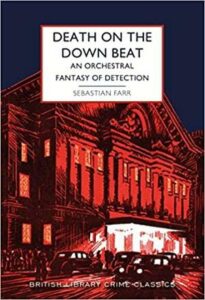 Death on the Down Beat, Sebastian Farr
Death on the Down Beat, Sebastian Farr
Death on the Down Beat was a bit of a surprise to me, to be honest. I hadn’t fully clocked the format: it’s an epistolary novel, based on the detective writing letters (and sending dossiers) home to his wife. (Amusingly, it’s very careful to make this feel a little more plausible, by the husband noting multiple times that he shouldn’t be doing this, but commenting on how helpful it is and asking his wife to file things for him in the usual way.) I knew that some extracts of a musical score were included — and an important clue — but not about the letters, and I think it helped this book feel a little different, even if the detective could barely be told apart from a host of other classic mystery detectives.
The letter format does mean that the reader is held at a bit of a distance from any action, and doesn’t get to know the characters directly. The suspects thus rather blur into each other, which makes it difficult to have any real suspicions — I went off on a completely wrong track, though I wasn’t really wrong about the motive. So that’s my main critique here: there’s a lot of superfluous stuff and a lot of suspects, and the information we need is rather camouflaged by all of that.
Which makes it sound like I didn’t enjoy it, when I definitely did: I think this format is a neat idea, and I enjoyed the fact that the detection process was complemented by an understanding of the music. Not that I did understand the music, but it was explained well enough to get the point, and like Sayers’ tube of flake white in Five Red Herrings, I bet a little prior knowledge really illuminates things, and that’s kinda neat too. (Maybe it’s not quite as… obscuring as the flake white that Sayers wouldn’t name, though.
Rating: 4/5
Tags: book reviews, books, British Library Crime Classics, crime, mystery, Sebastian Farr
Posted February 7, 2023 by Nicky in Reviews / 1 Comment
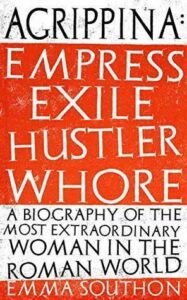 Agrippina: Empress, Exile, Hustler, Whore, Emma Southon
Agrippina: Empress, Exile, Hustler, Whore, Emma Southon
I really enjoyed Emma Southon’s book on murder in Ancient Rome, so I was eager to pick this up. I didn’t know much about Agrippina to begin with, beyond the most common stories, so it took some work to orient myself to her family tree (and of course, with the way that Romans only had about two names available per family so it sometimes feels like everyone is called Julia or Agrippina). Once oriented (with the help of Southon’s explanations and supplementary material), it’s quite the story: Southon sees Agrippina as a very capable woman who tried to do things not considered suitable for a woman in her context, and nonetheless being fairly successful, on the whole.
Southon’s tone is irreverent, as in her other book, and that might put off people who are looking for “serious” history. Despite that, and the lack of direct sourcing, Southon makes it very clear when she’s speculating and what she thinks is possible, what she thinks is likely, and what she thinks is a certainty. Don’t let the tone fool you: she’s really quite careful about that, and many historians are not (or not always). Southon outright tells you that she’s imagining what Agrippina might have done, and based on what; other authors will look at the possibilities, pick their favourite, and present that as what happened because it’s what they think happened.
Southon’s book is pretty sympathetic to Agrippina, where generally I’ve seen her treated very critically, and she does good work in revealing where that came from and why. Overall, Agrippina was an enemy I wouldn’t have liked to make — and one who got the things she wanted from life, even if they then killed her. Southon’s interpretation is striking and refreshing.
I did actually find it a bit slow going at times, despite that, but I don’t think that’s the fault of Southon, or of the material. This just didn’t feel as fresh as A Fatal Thing Happened on the Way to the Forum — despite Southon’s irreverent tone, it’s still a biography, and those can kinda drag for me.
Rating: 3/5
Tags: book reviews, books, Emma Southon, history, non-fiction
Posted February 5, 2023 by Nicky in Reviews / 0 Comments
 Murder: The Biography, Kate Morgan
Murder: The Biography, Kate Morgan
Murder: The Biography is an interesting look at the history of murder, from the perspective of how different murder cases have changed the law (and how the law existing at the time impacted various murder cases). It’s written by a lawyer, but it’s accessible for the layperson, and Morgan remains keenly aware of how fascinating the topic of murder is to many. The details aren’t at all dry, but the back of the book contains details of how to find the relevant judgements, etc, for those who want to dig right into it.
For a reader of crime/mystery fiction, it has little to say about the fictional world (beyond a few comments that the bulk of murders are not like in books), just in case you were wondering — it focuses entirely on real-world cases, mostly things which helped to shape the law and other prosecutions. So we see things like the development of defences of diminished responsibility, and corporate manslaughter, through the lens of the events that prompted them. The latter law is still not really tested: the case of Grenfell, Morgan says, is a make-or-break moment for it, as you’d imagine.
I found it a really interesting read, and surprisingly quick. I wasn’t already aware of all of the murders, either. Just as a warning, there are a few really awful cases, such as the case of Dr Bateman’s negligence — skim that one if you’re a bit squeamish, and avoid the details.
Rating: 5/5
Tags: book reviews, books, crime, history, Kate Morgan, non-fiction
Posted February 2, 2023 by Nicky in Reviews / 0 Comments
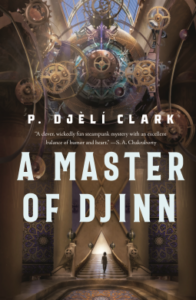 A Master of Djinn, P. Djèlí Clark
A Master of Djinn, P. Djèlí Clark
A Master of Djinn takes the threads from the novellas in this world — primarily A Dead Djinn in Cairo, but also the world-building and some characters from The Haunting of Tram Car 015 — and pulls them together into a full-length novel, with Agent Fatma as the lead. If you haven’t read those novellas, I’d strongly suggest doing so first: I suspect there are enough details here to let you jump in, but the novellas provide a lot of context (e.g. the Clock of Worlds, what exactly Fatma does, why the world is the way it is).
Clark seems to love writing female characters who have strong opinions and their own way of approaching the world: the central three female characters are each quite different, though driven and capable. Hadia is not a carbon copy of Fatma, despite their shared profession, and nor is she the wilting flower that Fatma originally expects — and Siti’s something else entirely. I found the female characters a joy here, to be honest, though I’d like to see more of Hadia and her weak points as well as all her surprising strengths.
As far as the antagonist goes, I called it well before the characters did, though in part that’s being outside the narrative and knowing how mysteries are structured. I was glad that Fatma realised a particular aspect of it before the story actually revealed it, because it would’ve felt weird if she wasn’t sharp enough to see that when I had realised it.
I found it really satisfying that this book pulled together the threads from the novellas, while creating a whole new story that revealed more of the world. It’s a book I may well come back to, as I did the novellas.
Rating: 4/5
Tags: book reviews, books, P. Djèlí Clark, SF/F
Posted January 30, 2023 by Nicky in Reviews / 0 Comments
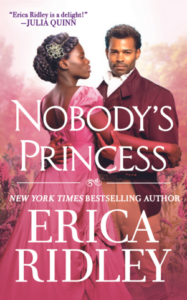 Nobody’s Princess, Erica Ridley
Nobody’s Princess, Erica Ridley
Nobody’s Princess gives Graham Wynchester a chance to really shine — something I’d been looking forward to for quite a while after his appearances in The Duke Heist and The Perks of Loving a Wallflower. Here he’s centre stage, romantic hero, and he finally has a chance to rescue a real princess (sort of).
Kunigunde is a visitor from the very kingdom the Wynchesters’ adoptive father Bean came from, and she’s on a mission to become a Royal Guardswoman, the very first. Her brothers have different ideas, and are trying pretty hard to chase her down, but Graham’s at hand to involve himself (whether she likes it or not) and save the day (whether or not she’d have come up with something for herself).
It was nice to see Graham front and centre, and maybe it’d just been a little while since I read the other books, but I was surprised by how silly he was at times. Not that I really should have been, given the Wynchesters’ banter amongst themselves — but I did have a touch of embarrassment squick about his quixotic attempts to be Kuni’s knight in shining armour.
I did love the way Kuni found herself falling in love with not just Graham, but the whole life of the Wynchester family. I wasn’t sure about how things were going to get figured out, but I found the end pretty satisfactory.
I didn’t love this as much as the first two books, and I had a bit of concern about the way Kuni was portrayed (in particular, the kind of language mistakes she made, which didn’t at all seem to fit with her proficiency with the language or my experience of people who speak English as a second language — I’m married to one, so you could say I’ve done extensive research on the subject). That said, I absolutely inhaled the book, and I had a lot of fun.
Rating: 3/5
Tags: book reviews, books, Erica Ridley, historical fiction, romance
Posted January 29, 2023 by Nicky in Reviews / 2 Comments
 The Soldier’s Scoundrel, Cat Sebastian
The Soldier’s Scoundrel, Cat Sebastian
Jack Turner is sort of a private detective, sort of an agent of poetic justice, handling messes that higher-class society folks want sweeping under the rug — an abusive husband, a case of blackmail, stolen items… He clashes with Oliver Rivington, a soldier in need of lawful stability after the war, after helping Oliver’s sister out with such a problem, and I honestly expected sparks to fly much more than they did. It’s such an easy source of conflict for a romantic relationship: their morals differ so much! They’re opposed on a fundamental level!
And indeed, it is part of the conflict — but part of the joy of the book is in fact that Oliver considers his errors, reconsiders his position, and unbends enough to listen to Jack’s point of view. It’s not his way or the highway; even when he briefly thinks it might has to be, he’s still open to communication.
Is their burgeoning relationship a heaven of perfect communication, the meeting of like minds? Nope. Oliver still balks at some of Jack’s opinions and methods, and Jack for his part has a lifetime of trauma that shapes how he sees Oliver’s thoughts and actions. Each has to bend a little, and make efforts, to make the thing work, but it all feels more gentle and more intimate because Oliver is prepared to bend, prepared to apologise, prepared to live at Jack’s level. I cared about their relationship all the more because the conflict wasn’t straight-forward, because Oliver wasn’t prepared to let it go too easily, and wasn’t too proud to apologise — and Jack wasn’t too proud to accept it.
Overall, I found this really enjoyable. Jack’s approach to justice isn’t mine, but it makes sense for his life, and Oliver’s acceptance of it makes sense as well, and their relationship genuinely feels built on more than just headlong attraction between two stubborn assholes who won’t talk to each other — which can be lacking in other romances, where I wonder how on earth they’ll get on in the long run given they spent a whole book refusing to bend only to have a dramatic rapprochement at the end.
Rating: 4/5
Tags: book reviews, books, Cat Sebastian, historical fiction, queer fiction, romance
 His Bloody Project, Graeme Macrae Burnet
His Bloody Project, Graeme Macrae Burnet








